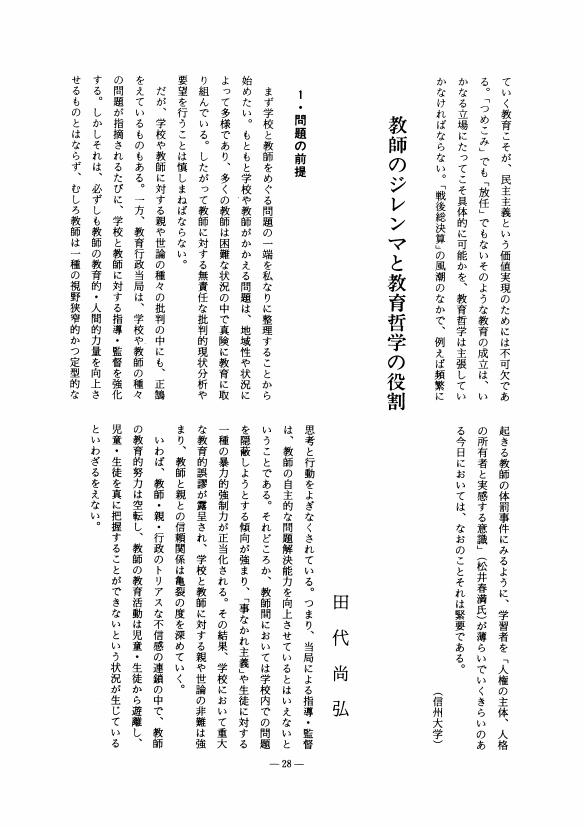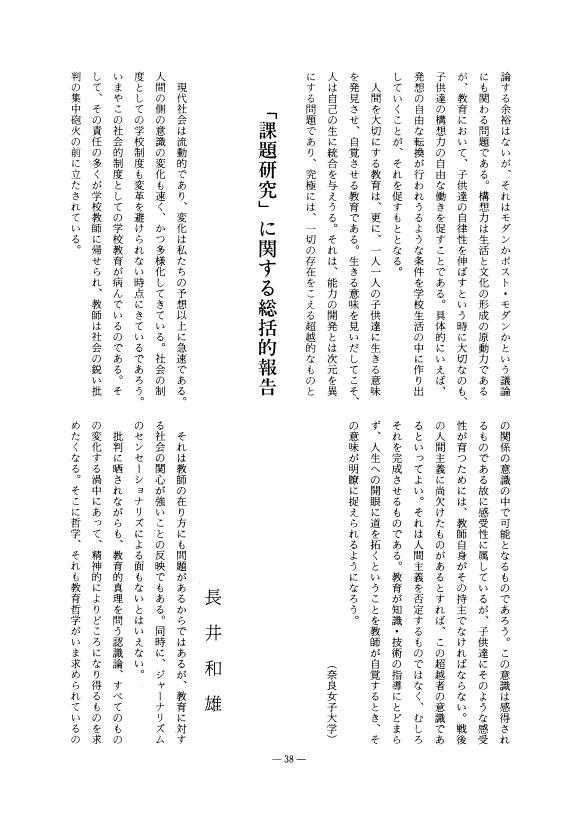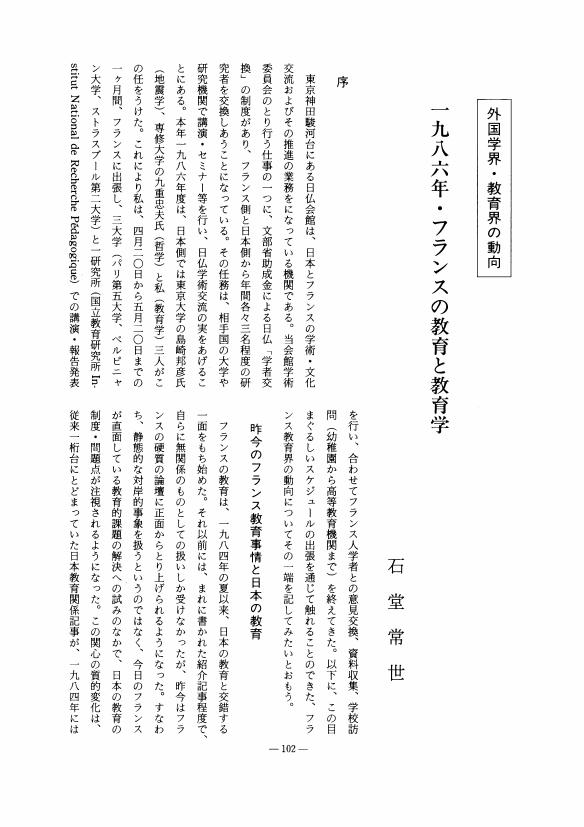1 0 0 0 OA 教育と教育を越えるもの ヤスパースにおける実存と教育
- 著者
- 吉村 文男
- 出版者
- 教育哲学会
- 雑誌
- 教育哲学研究 (ISSN:03873153)
- 巻号頁・発行日
- vol.1987, no.56, pp.1-14, 1987-11-10 (Released:2009-09-04)
- 参考文献数
- 10
人間が対象的に取り扱かわれることがますます一般的となり、一人一人のかけがえのなさがともすれば忘れられがちな現代において、教育の領域で、子どもや青年一人一人の個性の尊重とか、一人一人の子どもや青年を生かすといったことが主張されるのには、十分な理由があると思われる。ただ、そうした主張が有意義であるためには、「実存は、その自由の根底から、他の実存と本質的に相違している (wesensverschieden) 」といわれるような、他との比較を絶した自己自身としての実存という人間理解にまで至らねばならないのではないだろうか。小論は、そうした問題意識を背景にして、実存を哲学することの中心に置いたヤスパースの実存哲学から、教育を問いかえそうとする一つの試みである。
1 0 0 0 OA デューイ教育哲学における「個性 (individuality) 」の機能
- 著者
- 立山 善康
- 出版者
- 教育哲学会
- 雑誌
- 教育哲学研究 (ISSN:03873153)
- 巻号頁・発行日
- vol.1987, no.56, pp.15-28, 1987-11-10 (Released:2009-09-04)
- 参考文献数
- 52
本稿の目的は、デューイ (John Dewey1859-1952) の教育理論を、その哲学的人間観の基底において把え、そこには、一定の「個人主義的」な脈絡があり、「個性」こそが、教育という営為の能動性と受動性とを統合的に把える、デューイの人間主義的な教育の力動性を有効に展開させている一つの機能的な原理であるのを論証することにある。そこで本論では、まずデューイの「個性」の機能としての「動態的な自己 (dynamic self) 」の概念を検討し、ついで、こうした自己の「個性」が契機となって、自然や社会と相互媒介的に、共有されている意味を開示してゆく一定の脈絡を明らかにする。最後に、個性尊重の立場からはどうしても対峙せざるをえない学問中心主義の立場に触れ、そうした立場に前提されている知の「客観主義的な理想」に対する人間主義的な知識の成立基盤としての「個性」を、デューイの教育哲学における機能的側面から位置づけたい。
1 0 0 0 OA 人間は技術的に対象化されうるか M・ハイデッガーを手がかりとして
- 著者
- 砂原 由和
- 出版者
- 教育哲学会
- 雑誌
- 教育哲学研究 (ISSN:03873153)
- 巻号頁・発行日
- vol.1987, no.56, pp.42-54, 1987-11-10 (Released:2009-09-04)
- 参考文献数
- 37
The purpose of this paper is, taking hints from Heidegger's thought, to examine the meaning of objectivating man technically, thus trying to advance to the point of questioning the essence of technology. The paper consists of the following parts.I. Looking at the tendency of contemporary technology to include in its objects not only simple matter, but also language and knowledge.II. According to the technology theory of Heidegger, all being (Seiendes) can become the object of technology. Hence, if man is also a being, he, too, can become technologically speaking an object.III. However, at the time when Heidegger wrote “Sein und Zeit”, he did not consider man as a simple being. IV. But in front of contemporary technology man is merely a being. When Heidegger realised this fundamentally, he indicated a new relation between the being (Seiendes) and to be (Sein).
1 0 0 0 OA 教育哲学を考える
- 著者
- 久木 幸男
- 出版者
- 教育哲学会
- 雑誌
- 教育哲学研究 (ISSN:03873153)
- 巻号頁・発行日
- vol.1987, no.56, pp.55-56, 1987-11-10 (Released:2009-09-04)
1 0 0 0 OA 山鹿素行の教育論について 武教を中心に
- 著者
- 内山 宗昭
- 出版者
- 教育哲学会
- 雑誌
- 教育哲学研究 (ISSN:03873153)
- 巻号頁・発行日
- vol.1987, no.56, pp.57-60, 1987-11-10 (Released:2009-09-04)
- 参考文献数
- 7
1 0 0 0 OA フレーベルとセザンヌ 自然表現の解釈をめぐって
- 著者
- 岸 信行
- 出版者
- 教育哲学会
- 雑誌
- 教育哲学研究 (ISSN:03873153)
- 巻号頁・発行日
- vol.1987, no.55, pp.58-72, 1987-05-10 (Released:2010-05-07)
- 参考文献数
- 62
To compare the educational philosopher Fr.Frobel (1782-1852) with the painter P.Césanne (1839-1906) may seem as unexpectedly presenting something new. But, while at first sight, the two seem to have nothing in common, in fact a very important simalarity between the ideas of both men can be discovered. They have in common that both recognize as a norm the original form of 'nature' and tried to express it as something meaningful through human life. The way of expressing was different, 'art' on the one hand and 'education' on the other; for Césanne the goal of expression was 'painting', for Frobel the expression and the interpretation of nature was the task of 'education', it may be said. In this paper the author examines the similarity of the thinking of both men focusing on their expression and interpretation of nature including an investigation of the origin of the ressmblance of their ideas.
1 0 0 0 OA 人間形成における対話に関する一考察
- 著者
- 中井 孝章
- 出版者
- 教育哲学会
- 雑誌
- 教育哲学研究 (ISSN:03873153)
- 巻号頁・発行日
- vol.1987, no.55, pp.73-86, 1987-05-10 (Released:2010-05-07)
- 参考文献数
- 52
The purpose of this paper is to investigate the nature of dialogue (dia-logos) in educational practice form the phenomenological point of view. In learning topos, the occation on which creative dialogue develops between the teacher and the learner and between the learners themselves, lies within the 'hearing' process. 'Hearing' involves various steps. However, the teacher being all ear 'listening' to what the learner expresses out of his solitary problem awareness, is actually questioning the learner and at the same time, a process of creative dialogue starts when the teacher makes the learner express himself, thus stimulating the problem awareness of the leaner. In that sense, dialogue can be said to be an undertaking by which, without abandoning one's own indivisual nature, mutual positive self-assertion can be realised. Dialogue transcends the relative dimention of logos search (question and answer, talking to and response) -it arises rather from the radical topos making possible thus the logos search as such.
1 0 0 0 OA ペスタロッチーの教育思想における「自立」概念についての一考察
- 著者
- 宮本 要太郎
- 出版者
- 教育哲学会
- 雑誌
- 教育哲学研究 (ISSN:03873153)
- 巻号頁・発行日
- vol.1987, no.55, pp.45-57, 1987-05-10 (Released:2009-09-04)
- 参考文献数
- 41
The characteristic features of Pestalozzi's (1746-1827) concept of 'autonomy' are considered to be structurally speaking the three structural levels of economic autonomy, of legal or civic autonomy, and moral or internal autonomy, and internally speaking the harmonious development of the internal powers of man stemming from self-activity. This is the trust put into the spontaneity of human nature based on Leibniz' anthropology, and in this regard Pestalozzi follows the same line as Rousseau. Furthermore, autonomy according to Pestalozzi in the sense that it implies the potential condition of free self-determination it ressembles Kant's autonomy, on the other hand, because it is based on love rooted in faith, it differs from Kant's autonomy. In other words, starting from the negative education founded in an absolute and optimistic faith in nature (Rousseau), then standing on the rational will of moralizing man living in society (Kant), furthermore transcending this, too, a positive formation concept arises putting its hope in the purification of man as an organic whole by faith and love (Pestalozzi).
1 0 0 0 OA 「人間」を尚ぶ思想の再構築
- 著者
- 松井 春満
- 出版者
- 教育哲学会
- 雑誌
- 教育哲学研究 (ISSN:03873153)
- 巻号頁・発行日
- vol.1987, no.55, pp.33-38, 1987-05-10 (Released:2009-09-04)
主題に対しては先ず、教育学と教育哲学のアプローチの仕方の違いを私なりに明らかにしておくことが必要であろうが、その前に、教育改革論議自体について少し述べておきたい。
1 0 0 0 OA 教師のジレンマと教育哲学の役割
- 著者
- 田代 尚弘
- 出版者
- 教育哲学会
- 雑誌
- 教育哲学研究 (ISSN:03873153)
- 巻号頁・発行日
- vol.1987, no.55, pp.28-32, 1987-05-10 (Released:2009-09-04)
- 参考文献数
- 6
1 0 0 0 OA 教師による学習者理解の今日的意味
- 著者
- 清水 毅四郎
- 出版者
- 教育哲学会
- 雑誌
- 教育哲学研究 (ISSN:03873153)
- 巻号頁・発行日
- vol.1987, no.55, pp.24-28, 1987-05-10 (Released:2009-09-04)
1 0 0 0 OA 教育哲学を考える
- 著者
- 村井 実
- 出版者
- 教育哲学会
- 雑誌
- 教育哲学研究 (ISSN:03873153)
- 巻号頁・発行日
- vol.1987, no.55, pp.87-89, 1987-05-10 (Released:2009-09-04)
1 0 0 0 OA ルターの教育思想研究の課題と動向
- 著者
- 大曽根 良衛
- 出版者
- 教育哲学会
- 雑誌
- 教育哲学研究 (ISSN:03873153)
- 巻号頁・発行日
- vol.1987, no.55, pp.90-94, 1987-05-10 (Released:2009-09-04)
- 参考文献数
- 3
1 0 0 0 OA 「課題研究」に関する総括的報告
- 著者
- 長井 和雄
- 出版者
- 教育哲学会
- 雑誌
- 教育哲学研究 (ISSN:03873153)
- 巻号頁・発行日
- vol.1987, no.55, pp.38-44, 1987-05-10 (Released:2009-09-04)
1 0 0 0 OA 授業研究におけるPhilosophierenの推進を
- 著者
- 池野 正晴
- 出版者
- 教育哲学会
- 雑誌
- 教育哲学研究 (ISSN:03873153)
- 巻号頁・発行日
- vol.1987, no.55, pp.9-14, 1987-05-10 (Released:2009-09-04)
1 0 0 0 OA 研究討議に関する総括的報告
- 著者
- 宇佐美 寛
- 出版者
- 教育哲学会
- 雑誌
- 教育哲学研究 (ISSN:03873153)
- 巻号頁・発行日
- vol.1987, no.55, pp.14-18, 1987-05-10 (Released:2009-09-04)
1 0 0 0 OA 教育改革のなかの教師の役割
- 著者
- 石堂 常世
- 出版者
- 教育哲学会
- 雑誌
- 教育哲学研究 (ISSN:03873153)
- 巻号頁・発行日
- vol.1987, no.55, pp.19-24, 1987-05-10 (Released:2009-09-04)
1 0 0 0 OA 授業における哲学
- 著者
- 上田 薫
- 出版者
- 教育哲学会
- 雑誌
- 教育哲学研究 (ISSN:03873153)
- 巻号頁・発行日
- vol.1987, no.55, pp.1-3, 1987-05-10 (Released:2009-09-04)
1 0 0 0 OA 一九八六年・フランスの教育と教育学
- 著者
- 石堂 常世
- 出版者
- 教育哲学会
- 雑誌
- 教育哲学研究 (ISSN:03873153)
- 巻号頁・発行日
- vol.1986, no.54, pp.102-107, 1986-11-10 (Released:2009-09-04)
- 参考文献数
- 9
1 0 0 0 OA 「授業」を創る
- 著者
- 斎藤 勉
- 出版者
- 教育哲学会
- 雑誌
- 教育哲学研究 (ISSN:03873153)
- 巻号頁・発行日
- vol.1987, no.55, pp.4-9, 1987-05-10 (Released:2009-09-04)












